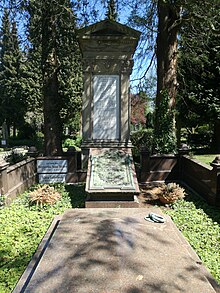Hermann Strater
Hermann Robert Gustav Hubert Sträter (born April 10, 1891 in Aachen ; † July 20, 1956 there ) was a Prussian administrative officer , 1944/1945 district administrator of the district of Aachen and 1955/1956 representative of the district president in Aachen .
Life
1891 to 1921
Hermann Sträter grew up as the son of the secret government councilor Eduard Sträter and Paula, b. Kesselkaul in Aachen. His two second cousins Hermann Joseph Sträter and Eduard Sträter, as well as his great-uncle August Sträter , also belonged to the family environment . After visiting the Kaiser-Karls-Gymnasium , which he left at Easter 1910 with passing the final examination, Hermann studied Sträter at the Universities of Lausanne , Friborg and Bonn law . With the completion of his studies he became a court clerk entered the Prussian judicial service, where he used the Cologne Court found (24 December 1913). From August 6, 1914 to December 1918, he served as a reserve officer during the First World War . During this period, Strater was transferred to the government in Münster on May 11, 1918 as a government trainee.
1921 to 1933
After passing the Grand State Examination , he was appointed government assessor (January 9, 1921), after which he was transferred to the Koblenz government on January 14, 1921 . In February 1922 temporarily transferred to the police chief in Aachen (the decree was repealed again), he was assigned to the district president of Koblenz, Paul Brandt, who was deported to Wetzlar . After his appointment to the government council (January 22, 1925), he was transferred to the police headquarters in Gelsenkirchen on August 1. There he took over the management of the police office in October of the same year. From November 1, 1928, Sträter moved from Gelsenkirchen to Magdeburg to the police headquarters there. Through his appointment to the Upper Government Council in June 1929, he was also appointed permanent representative of the Police President. In the same position, he moved to the Bochum Police Headquarters on January 16, 1933 , but after the National Socialists came to power on April 11, 1933, he was appointed to represent the district of Olpe .
1933 to 1956
Sträter held the office of Olpen District Administrator for only seven months. On November 10, 1933, he was transferred to the local government in Aachen. In which he was in service until their evacuation in September 1944. After the surrender of the city of Aachen (October 21, 1944), Hermann Sträter was initially designated as mayor , but was temporarily imprisoned, later rehabilitated and appointed by the Americans on December 2, 1944 as district administrator of the Aachen district. After his dismissal by the military government on September 5, 1945, Hermann Sträter began again as an employee of the government in Aachen on February 1, 1947 and was appointed government director there on February 9, 1948. Since April 27, 1954, Sträter has also been a permanent representative of the public interest at the regional administrative court in Aachen . When the new Aachen District President, Hubert Schmitt-Degenhardt , took office on June 1, 1955, he was commissioned to act as its permanent representative. Hermann Sträter retired on May 30, 1956, which he only survived by seven weeks. He was married and had four children.
family
Hermann Sträter married on April 26, 1926 in Aachen Maria Berta Mathilde Wilhelmine Alexandra Alida Heusch (September 30, 1897 in Aachen; † November 19, 1973 there), a daughter of the manufacturer, politician and functionary Albert Heusch and Berta, née Janssen. His younger sister Klara had been married to Wilhelm Leopold Janssen , a lawyer and temporary district administrator of the Aachen district , who was also a cousin of his wife, since 1922 . Hermann Sträter found his final resting place in Aachen's Ostfriedhof .
literature
- District Assembly of North Rhine-Westphalia (ed.): Documentation on the district administrators and senior district directors in North Rhine-Westphalia 1845–1991. Knipping, Düsseldorf 1992, p. 245.
- Karl Fix (arrangement): Eifeler gender book. Second volume (= German gender book. Genealogical handbook of bourgeois families, volume 123), CA Starke, Glücksburg 1958.
- Joachim Lilla: Senior administrative officials and functionaries in Westphalia and Lippe (1918–1945 / 46). Biographical manual. (= Publications of the Historical Commission for Westphalia XXII A, Historical Works on Westphalian State Research, Economic and Social History Group, Volume 16), Aschendorff, Münster 2004, ISBN 3-402-06799-4 , p. 291.
Individual evidence
- ↑ a b c d Joachim Lilla: Senior administrative officials and functionaries in Westphalia and Lippe (1918–1945 / 46). Biographical manual.
- ^ A b Landkreistag North Rhine-Westphalia (ed.): Documentation on the district administrators and senior district directors in North Rhine-Westphalia 1845–1991
- ↑ Alida Sträter's life data, accessed on November 21, 2012 ( page no longer available , search in web archives ) Info: The link was automatically marked as defective. Please check the link according to the instructions and then remove this notice.
- ^ A b Karl Fix (arrangement): Eifeler gender book. Second volume
| personal data | |
|---|---|
| SURNAME | Strater, Hermann |
| ALTERNATIVE NAMES | Sträter, Hermann Robert Gustav Hubert |
| BRIEF DESCRIPTION | Administrative officer, district administrator and deputy. District President |
| DATE OF BIRTH | April 10, 1891 |
| PLACE OF BIRTH | Aachen |
| DATE OF DEATH | July 20, 1956 |
| Place of death | Aachen |
